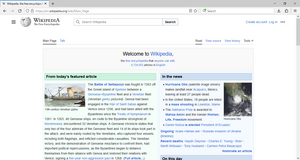Waterfox
Topic: Software
 From HandWiki - Reading time: 6 min
From HandWiki - Reading time: 6 min
 | |
 Screenshot of Waterfox G6.0.5 running on Windows 10, showing the English Wikipedia. | |
| Original author(s) | Alexandros Kontos |
|---|---|
| Developer(s) | Waterfox Limited |
| Initial release | 27 March 2011 |
| Stable release | G3.2.6 (15 September 2021[1]) [±] |
| Preview release | G6.0 Beta 5
/ September 14, 2023 |
| Written in | C, C++, CSS, JavaScript, XUL |
| Engine | Gecko, SpiderMonkey |
| Operating system | Windows 7 or later, Mac, Android, Linux |
| Platform | x64, ARM64, PPC64LE |
| Type | Web browser, mobile web browser, feed reader |
| License | MPL-2.0 |
Waterfox is a free and open-source web browser and fork of Firefox. It claims to be ethical and user-centric, emphasizing performance and privacy.[2] There are official Waterfox releases for Windows, macOS, and Linux.[3] It was initially created to provide official 64-bit support, back when Firefox was only available for 32-bit systems.[4]
Divisions
Waterfox
Waterfox shares core features and technologies like the Gecko browser engine[5] and support for Firefox Add-ons[6] with Firefox. It is also compatible with Google Chrome and Opera extensions.[2] It disables telemetry and Pocket by default, which are present in Firefox builds. However, it collects technical information about the user's device to update properly.[4]
Waterfox Classic
Waterfox Classic is a version of the browser based on an older version of the Gecko engine that supports legacy XUL and XPCOM add-on capabilities that Firefox removed in version 57.[7][8] It is still partially maintained with fixes and patches from Waterfox and Firefox ESR releases. However, its development has been separated due to several changes from Waterfox that are otherwise unapplicable.[9]
Vulnerability
Waterfox Classic has multiple unpatched security advisories. The developer states that "changes between versions so numerous between ESRs making merging difficult if not impossible".[10][9]
History
Waterfox was first released by Alex Kontos[11][4] on March 27, 2011 for 64-bit Windows. The Mac build was introduced on May 14, 2015 with the release of version 38.0,[12] the Linux build was introduced on December 20, 2016 with the release of version 50.0,[13] and an Android build was first introduced on October 10, 2017 in version 55.2.2.[14]
From July 22, 2015 to November 12, 2015, Waterfox had its own search-engine called "Storm" that would raise funds for charity and Waterfox. Storm was developed with over £2 million of investor funding and powered by Yahoo! Search.[15][16][17]
In December 2019, System1, an advertising company which portrays itself as privacy-focused,[18] acquired Waterfox.[19][20] In July 2023, Alex Kontos announced that Waterfox had been turned into an independent project again.[21]
Logos
See also
References
- ↑ "Waterfox G3.2.6 - Third Generation Release". https://www.waterfox.net/blog/waterfox-G3.2.6/.
- ↑ 2.0 2.1 "What Is Waterfox and Is It Safe?" (in en). 2022-09-13. https://www.makeuseof.com/is-waterfox-safe/.
- ↑ "Waterfox, Free Web Browser" (in en). https://www.waterfox.net/download/.
- ↑ 4.0 4.1 4.2 Proven, Liam. "Waterfox: A Firefox fork that could teach Mozilla a lesson" (in en). https://www.theregister.com/2021/11/04/waterfox_firefox_fork/.
- ↑ "FAQ" (in en). https://www.waterfox.net/docs/faq.
- ↑ "Find and install add-ons to add features to Waterfox". https://www.waterfox.net/support/WINNT/find-and-install-add-ons/.
- ↑ Kev Needham (2015-08-21). "The Future of Developing Firefox Add-ons". https://blog.mozilla.org/addons/2015/08/21/the-future-of-developing-firefox-add-ons/.
- ↑ Villalobos, Jorge (2017-02-16). "The Road to Firefox 57 – Compatibility Milestones". https://blog.mozilla.org/addons/2017/02/16/the-road-to-firefox-57-compatibility-milestones/.
- ↑ 9.0 9.1 "Waterfox Classic development will continue, but as a separate project from G4". November 4, 2021. https://www.ghacks.net/2021/11/04/waterfox-classic-development-will-continue-but-as-a-separate-project-from-g4/.
- ↑ "Unpatched Security Advisories · WaterfoxCo/Waterfox-Classic Wiki" (in en). https://github.com/WaterfoxCo/Waterfox-Classic/wiki/Unpatched-Security-Advisories.
- ↑ "About Waterfox" (in en). https://www.waterfox.net/docs/.
- ↑ Kontos, Alex. "Waterfox 38.0 Release". https://www.waterfoxproject.org/blog/waterfox-38.0-release-download.
- ↑ Kontos, Alex. "Waterfox 50.1.0 Release (Windows, Mac & Linux)". https://www.waterfoxproject.org/blog/waterfox-50.0-release-download.
- ↑ Kontos, Alex. "Waterfox 55 Release (Windows, Mac, Linux and Android)". https://www.waterfoxproject.org/blog/waterfox-55.0-release-download.
- ↑ Kontos, Alex (12 May 2015). "4 Year Anniversary: Waterfox Charity and Storm Search". https://www.waterfoxproject.org/blog/waterfox-charity-storm-search.
- ↑ "New search engine from Waterfox founder aims to take a punch at Google". https://www.telegraph.co.uk/finance/businessclub/technology/11598207/New-search-engine-from-Waterfox-founder-aims-to-take-a-punch-at-Google.html.
- ↑ Lake, Howard (2015-08-07). "'Ethical search engine' Storm to generate funds for charities" (in en). https://fundraising.co.uk/2015/08/07/ethical-search-engine-storm-to-generate-funds-for-charities/.
- ↑ Brinkmann, Martin (14 February 2020). "Waterfox web browser sold to System1". https://www.ghacks.net/2020/02/14/waterfox-web-browser-sold-to-system1/.
- ↑ "Waterfox has joined System1". 14 February 2020. https://www.waterfox.net/blog/waterfox-has-joined-system1/.
- ↑ "Welcome Waterfox!". https://www.system1.com/press/system1-welcomes-waterfox.
- ↑ Kontos, Alex (2023-07-03). "A New Chapter for Waterfox" (in en). https://www.waterfox.net/blog/2023/07/03/a-new-chapter-for-waterfox.
External links
 |
 KSF
KSF





